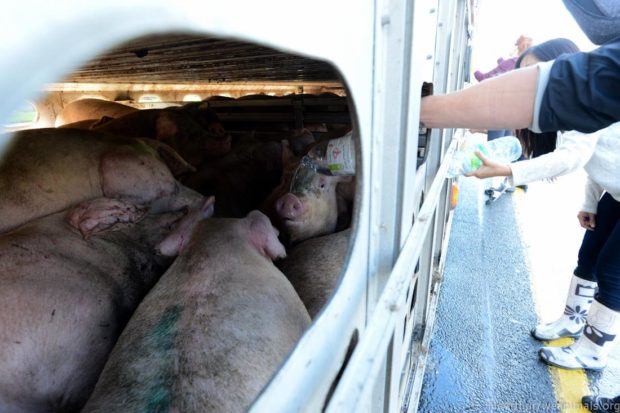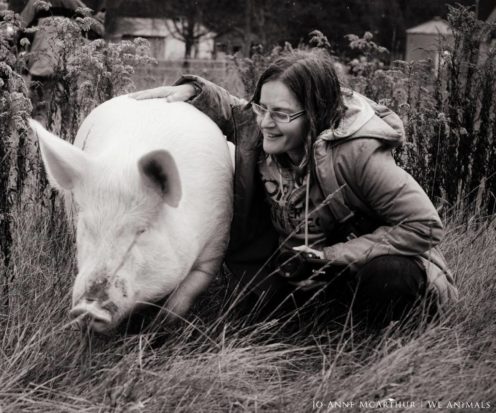As I write this, a woman in Canada named Anita Krajnc is standing trial for an act of pure compassion. Her alleged crime? In June of last year, the Toronto resident let pigs crowded into a trailer on a scorching summer day, obviously parched and in distress, lap up some water before they were transported to slaughter.
Footage of the incident reveals gasping, desperate pigs drinking the water that Ms. Krajnc provided through the side of the truck. Unbelievably, the driver of the vehicle and the owner of the pigs both called the police in response to Ms. Krajnc doing something that any good person would do for a person or animal in trouble.

Anita Krajnc is on trial because In June last year, the Toronto resident let pigs crowded into a trailer on a scorching summer day, obviously parched and in distress, lap up some water before they were transported to slaughter. Photo by Jo-Anne McArthur/We Animals
While pigs are considered property in Canada, Ms. Krajnc’s lawyers argue that she was — both through her actions and the motivation for them — serving the public good. The pigs, they assert, were distressed, and in the absence of a sufficient law or common industry standards that compelled the hauler to act, it was her duty to help.
This wasn’t the first time that Ms. Krajnc had offered water to animals on their way to slaughter, nor, by her own declaration, will it be her last. In 2010, Ms. Krajnc co-founded Toronto Pig Save, a group dedicated to bearing witness to animals in the last minutes of their lives and, when possible, offering a final act of mercy by providing them with water. In the years since it was founded, Krajnc’s group has become well-established in the Toronto area, holding weekly vigils outside local pig, chicken, and cattle slaughterhouses. Inspired by Krajnc, dozens of Save groups have been founded worldwide in recent years, including more than 20 here in the United States.
Some might have thought the prosecution of Anita Krajnc would be a deterrent to the Save groups. But it soon became clear that the trial was bolstering their efforts by shining a global spotlight on the terrible plight of farm animals in transport. During their testimonies, both the truck driver and the owner of the pigs testified about the treatment of farm animals during transport and their statements reveal that many standard industry practices subject animals to unimaginable levels of suffering.
In 2010, Anita Krajnc co-founded Toronto Pig Save, a group dedicated to bearing witness to animals in the last minutes of their lives and, when possible, offering a final act of mercy by providing them with water. Inspired by Krajnc, dozens of Save groups have been founded worldwide in recent years. Above, Krajnc with Esther the Wonder Pig. Photo by Jo-Anne McArthur/We Animals
In Canada, pigs can be transported in extreme weather conditions for up to 36 hours without being offered food, water, or rest. For other farm animals, the journey can extend to 72 hours. American law is hardly any better, restricting transport to 28 hours for pigs, even while all parties acknowledge it’s very difficult to enforce. In the European Union, that limit is just eight hours. According to figures from the Canadian Food Inspection Agency, up to three million farm animals die during transport each year, with millions more so sick or injured that they must be euthanized upon arrival.
Late last month, California governor Jerry Brown signed AB 797, the Right to Rescue Act, into law. The new law, supported by The HSUS, protects bystanders from prosecution should they have to break into a vehicle to save a pet from overheating. The law was written in response to the tragic and avoidable deaths of a series of family pets across California and will save lives by allowing concerned citizens to act without fear of committing a crime.
As a society, we know that it’s wrong to let animals languish in hot vehicles, and our laws are changing to reflect our values. Anita Krajnc sought to relieve the suffering of animals in distress, and she did so peacefully. Just because the creatures were pigs, destined for slaughter, doesn’t mean they don’t deserve our mercy.
Ms. Krajnc testified yesterday and repeated the reason she has already given regarding the motivation for her actions––that she was practicing the “golden rule” of treating others as we would like to be treated. Krajnc has said: “If someone’s thirsty, you give them water.” I stand with Anita, and hope you will too.
The post Canadian on trial for giving a suffering animal a drink appeared first on A Humane Nation.
Enviroshop is maintained by dedicated NetSys Interactive Inc. owners & employees who generously contribute their time to maintenance & editing, web design, custom programming, & website hosting for Enviroshop.

